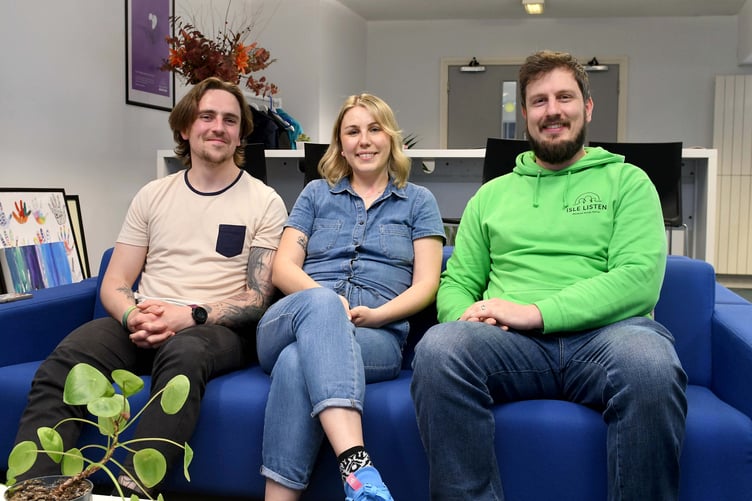As part of Mental Health Awareness, reporter Rhian Evans speaks to charity Island Listen’s schools team.
‘Self-harm and suicidal thoughts. Those are the dominating issues we’re seeing in young people says Jay Wight, one of the members of Isle Listen’s school team.
‘We’re seeing a rise in self-harm’ adds fellow team member Sammy Quinn, ‘over 60% of our Tier 2 referrals have self-harmed in one way or another, usually either by cutting or restricting food or overeating.’
I’m sat in Isle Listen’s headquarters with their school’s team, which is made up of Jay, Sammy and David Birtles.
All have a light joviality about them, which quickly levels when the interview starts. They want to get across the hard stuff and think it’s important to not sugar-coat it.
Isle Listen works with both primary and secondary schools but this team primarily focuses on high school students.
Schools put referrals into the charity, they then with Isle Listen Wellbeing Practitioners for their initial assessment and ongoing sessions.
In the 2022/23 academic year, the team received 344 referrals from young people, schools, parents and other services.
Over 1,140 hours of one-to-one support sessions were provided in schools to 267 young people.
Acknowledging the courage it takes young people to ask for support in the first place to then be told they have to wait before receiving help, Isle Listen’s schools team aims to fill the gap of young people getting assessed by CAMHS then getting lost in the ethos of a long waiting list due to a strain on resources.
The team has a two-tier system it works to. Tier One provides a lower-level service of intervention that deals with things like friendship issues and social anxieties.
Tier Two consists of interpersonal counselling for young people in distress suffering from stress and depression or facing difficulties in relationships.
I asked what other ‘trends’ the team had seen in high school students besides suicidal thoughts and self-harm. ‘Body image and self-esteem are also prominent’ David replied, adding they see a lot of kids with anxiety around friendship groups, particularly during the transition between primary school and high school.
Not just in feeling stressed about making new friends but also guilty in feeling like they’re leaving old ones.
It’s difficult to say whether self-harm in students is happening more than in previous years or if people are just more open about talking about it.
The stigma around speaking up about mental health seems to be breaking down, something the team says is a silver lining in this process.
However, though the charity has seen progress in young people being more vocal about their mental health, they’ve faced opposition from some school professionals who were concerned that encouraging students to be more open about self-harm could lead to them self-harming.
Though it’s difficult to see self-harm be so prominent in young people in the Isle of Man, the Isle Listen team thinks it’s important to highlight just how prevalent the issue is.





Comments
This article has no comments yet. Be the first to leave a comment.